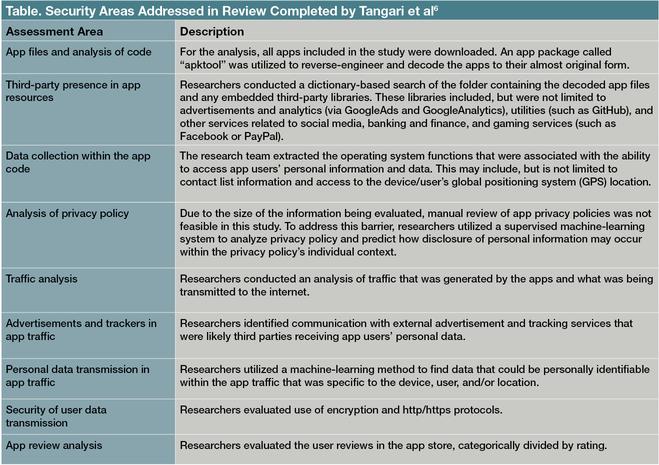In the previous 2 parts of this series on mHealth apps, we examined the barriers in access to care and what apps are available to assist in treatment of depression and suicide prevention. In this installment, we will cover the potential challenges and unintended consequences of utilizing this technology.
Unintended Consequences: Inaccurate Information and Self-Diagnosis
Apps of all kinds in the Android Google Play and Apple Store calculate ratings based on independent user feedback. User feedback is subjective and does not involve a review process or other rigor. An app may have a 5-star rating based on user feedback; however, this rating does not require any third-party verification of the quality, security, efficacy, or validity of the app.1 Given the lack of consistent oversight or regulation, there is no penalty for mHealth apps providing non-evidence-based and/or inaccurate information.2 A lack of reliable oversight means there is no verification of information quality. A study by Stawarz et al3 found that many of the apps with high user ratings had an inconsistent evidence base, demonstrating that priorities to the user that would translate to a higher app rating do not indicate solid validity and sound evidence.
More In This Series
Part 1: mHealth Apps for Depression: Overcoming Challenges
Part 2: Treating Depression and Preventing Suicide: The Impact of mHealth Apps

Another potential challenge specifically with mHealth apps for depression is that of patient self-diagnosis. Patients may self-identify that they are depressed, but in the absence of a full psychiatric evaluation by a trained mental health professional, they could very well meet criteria for a different condition that would require specific intervention and treatment tailored to that disorder. This can lead to negative treatment outcomes and misdirection of efforts supporting treatment of a condition that may not apply to a given consumer.
Clinical Validation and Efficacy
The clinical utility and efficacy of the data provided within these apps is an important consideration. Currently there is no formal review process for mHealth apps, and that has been an ongoing barrier. The existing medical research on apps is not very robust, and it is quite far behind relative to how widely mHealth apps are utilized.1 With the existing research being so limited, another factor to consider is that the studies that exist often include very small sample sizes.4 Research conducted on these apps also tends to be short in duration, without longer-range follow-up to evaluate outcomes.5
Privacy of Patient Information
Security of patient data is an important consideration within the context of using mHealth apps for depression. Protected Health Information (PHI) breaches are reported on the news nationally and worldwide every day. All breaches, whether large or small, have the potential for significant impact for individuals, communities, and larger populations. An in-depth study of some mHealth apps found that there was transmission of medical data via unsecured processes, and that privacy policies were lacking relative to the kind of information being obtained from individuals.1
The aim of a cross-sectional study by Tangari et al was to evaluate the collection of user data within mHealth apps, and to review the privacy practices of apps and potential risks to customer information.6 It was noted that amongst the top mHealth apps, privacy disclosures to the app user was consistently inadequate. The evaluation of privacy and security of these apps is complex and multifactorial. See theTable for an overview of the components addressed in the security review of apps.6
In the study by Tangari et al, 665 different third parties were identified as being able to access patient information contained within the apps.6 It was noted that a list of some specific third parties had accessed the most data—more when compared with the rest of the third parties obtaining this information. The vast majority of the apps reviewed were able to obtain and share personal information of the apps’ users. The review found that many privacy policy links did not work or were not reliable.
Patient Safety and Risk








